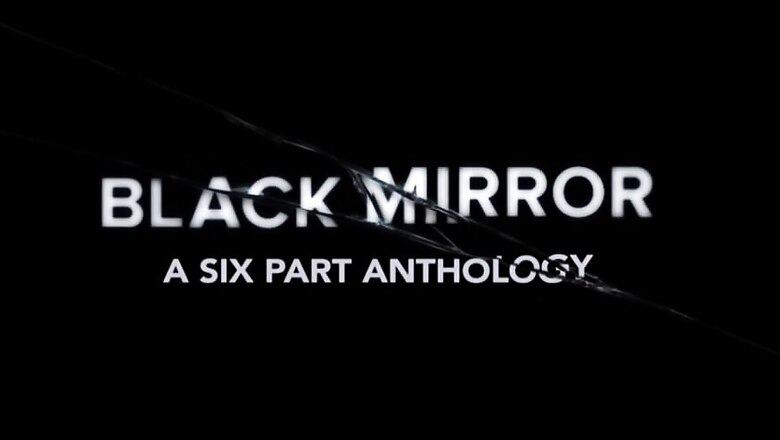
views
Spoiler Alert: This review contains a few spoilers to some episodes.
Black Mirror holds up a literal black mirror to contemporary and near-future human society and behavior and our collision course with technology. And as science fiction would suggest, that's a collision that will likely see man wiped out by his own hubris, a la Terminator style, at the worst. At best, we'll just be mindless drones to our cybernetic overlords. Given this happy premise, Black Mirror's creator Charlie Brooker has usually taken the series on a road to perdition, even if it's more technological than biblical. There are way too many villains and very few heroes in the show's universe, which is probably why the odd episode like 2016's San Junipero -- which implied a happy ending -- makes such a big splash. After all the gloom and doom, it's always nice to get a dose of hope.
And so for the fourth season of the show, Brooker tries to infuse some hope (and way too many references to San Junipero) into the otherwise bleak world of Black Mirror. Don't get us wrong, there's plenty of tech-inspired misery for you to binge on, but every once in a while you get a nice boost of endorphins to brighten your viewing. Look, instead of coming up with clever metaphors why don't I just break down the season for you, with episodes ranked worst to best.
Crocodile
Look, we get it. Black Mirror is bleak and harsh, and doesn’t pander to light-heartedness. But there’s being bleak because it’s an effective way to tell a story and then there’s being bleak simply for the sake of being bleak. Crocodile, which is this season’s third episode, unhappily falls into the latter category. Not even an atom of hope in this one, basically.
Andrea Risebrough's Mia Nolan is a successful, innovative architect who is saving the world one innovative office-cum-residential complex at a time. Also, 15 years ago, she and her boyfriend-at-the-time ran over a cyclist after driving back from a drug and alcohol-fueled party, and proceeded to hide the crime.
So 15 years later, when her former boyfriend -- who's unemployed and a recent awardee of the nine-month sobriety chip -- decides to come clean and confess to the crime anonymously, Mia naturally decides to murder him in her hotel room. This then fuels a kill spree in which Mia murders a Muslim insurance investigator, her black husband and their mixed-race two-year-old blind baby to cover her tracks. Also, a hamster's memories lead to her being finally convicted.
Despite the rodent-empowered ending and the gorgeous backdrop of Iceland wherein all these quasi-adventures take place, this is perhaps the worst episode in four seasons. It doesn't matter that the insurance investigator loves peppermint twirls (always a humanizing factor), or that Black Mirror's sonic Easter egg "If you know what love is" echoes through the episode, it's just really unnecessary. Perhaps Brooker wanted to remind us that human beings are terrible. But we have Twitter feeds, we already knew that.
Metalhead
So this isn't so much an episode addressing ‘specific and real-time concerns with future technology’ (the leitmotif of Black Mirror) as it is a vague warning of things to come: a dystopic world where humans are kind-of, sort-of being hunted down merely for wanting to get stuff.
Lead actor Maxine Peake attempts to survive a timescape which involves very few humans (there are literally two other people, who get disemboweled in the first 10 minutes of the episode) and a cybernetic race of search-and-destroy dogbodies (literally Doberman-shaped kill machines) who seek and destroy people that take stuff that doesn’t belong to them. It’s not about loyalty or morality as such; it’s the most messed-up tutorial on ‘this is mine, don’t touch’.
There's no explanation as to how and why humanity became a hunted species; the only possible one I could come up with was that we had programmed these guard/attack dogs to guard our own technologies from other humans and they eventually overran the world because humans don’t understand the concept of ownership, intellectual or otherwise. So whoever programmed these cyber-hounds didn’t include a manual on copyrights and other ownership modules in the software. Weird!
Shot entirely in B&W, it’s visually arresting because of the hunting trope and is the shortest Black Mirror episode to date. And that’s all it has.
Hang the DJ
The weird thing is, despite realizing its attempts to shamelessly cash into Season 3’s San Junipero, you can’t help go along with Hang the DJ. Naomi Campbell’s Amy and Joe Cole’s Frank are utterly engaging leads; two normal young people trying to find their perfect match via tech-approved The System, featuring a vestibule-like sentient touch pad known as Coach.
Marooned in ‘The Hub’, Amy and Frank are just a girl and a guy, trying to get along, in a curated world in which The System and Coach are trying to find people their ‘perfect match’. This means putting users through a series of relationships with ‘expiry dates’ until each person’s ultimate partner is located, thanks to calibrations fed in from their previous dalliances. Amy and Frank’s first relationship has an expiry date of 12 hours; after various relationships they’re set up again with another expiry date. They decide to ultimately buck the system as they find the perfect match in each other despite an App’s dire warnings.
This would have still worked but then there's the episode’s big reveal: they’re both simulations of human beings. Thereafter you realize that you were emotionally invested in beta-testing online avatars for Tinder Plus. Pass.
Arkangel
Are you a parent? Have you ever been terrified about what your kids get up to? Arkangel has a solution. A simple, painless inoculation of spyware into your child's head gives parents an e-tablet provides you with a creepily intrusive POV in to what their children are doing, saying or even feeling. Kid's blood sugar going down? You get a notification. Kid trying out narcotics? You get a notification. Kid's cortisol/stress hormone levels going up? You get a notification and also get the option to visually and aurally blocking out the source of stress. This is great if your toddler has to cross a home guarded by a bark-happy dog; perhaps not so much if your toddler is alone at home with a grandparent who gets a stroke and is immediately blocked out of sight and sound due to potential stress.
Rosemarie DeWitt's Marie is a single-parent to Sara, and prey to every single-parent's nightmare of not being there for their kid. After briefly losing Sara in a park, Arkangel's (free) beta technology seems a boon to the working mother. Until Sara fails to register that her granddad is having a stroke. Lesson learned, Marie puts away her Arkangel tab, and let's Sara be. Until Sara hits high-school puberty and begins lying to her mother.
Re-enter Arkangel, and Marie being treated to a first-hand perspective of Sara losing her virginity, doing drugs and generally growing up. Marie doesn't take it well; Sara, on finding out that her mother is spying on her takes it worse. Guess who wins? Technology, of course.
Black Museum
This has Black Mirror pandering to the Easter-egg obsession of many a cult series' internet followings, and is just amazing as it comes seasoned with the technologies of previous Black Mirror seasons as well as new ones. Douglas Hodge is the grotesque yet engaging proprietor of the Black Museum, a road-side attraction featuring cybernetic-influenced human crimes, into which bored traveler Nish (Letitia Wright) stumbles, while seemingly waiting for her vintage car to charge its solar battery.
A mostly flashback-enforced episode featuring the breakdown of individual morality in the face of technology, Black Museum has Hodge playing Rolo Haynes, an immoral business executive who marketed and endorsed Black Mirror's previously featured technologies to individuals and governments mostly to everyone's detriment. Finally kicked out of both government and private enterprise, Haynes establishes his freak-show featuring victims and villains from previous private-public joint ventures, initially catering to the general public and then the more morally bankrupt and sadistic.
With a slow reveal of intentions, aided by Haynes' vicarious pleasure in narrating his tales of woe, this is one slick, sick episode. In a good way.
USS Callister
Perhaps out of sheer sympathy for all that humanity went through in 2017, the first episode of Black Mirror's fourth season is its most feel-good, if only in a virtual sense. It's also its best.
Jesse Plemmons is Robert Daley, the apparently mild-mannered (read loser) Chief Technical Officer and co-founder of Callister Inc., an extremely successful multiplayer online VR game, who's not so much despised by CEO and co-founder James Walton (Jimmi Simpson) and his employees as he is derided for his anti-social behavior. So, perhaps, it's no surprise that Daley has his own offline modification of the game confined to his home, modeled after his favorite childhood TV show, Star Fleet, wherein he is the fearless captain of a space exploration vessel manned by digital copies of his co-workers from the real world.
Dazzlingly retro, Star Fleet isn't so much a carbon copy of Star Trek (though it is that) as it is a spoof of it -- complete with attractive women in attire wildly inappropriate for the freeze of deep space as well as Wagnerian villains and quasi-alien monsters -- at least in the eyes of the Black Mirror production crew. Daley himself is a fervent believer in the high moral standards of Space Fleet, its declared mission and most importantly, the strict chain of command.
That's because more than a joy ride into space, for Daley, his Space Fleet game is a way to vent out his frustrations on his real-life colleagues in a virtual world. Yes, he's basically a troll. So the alpha-male CEO Walton becomes a sniveling lieutenant, a snooty receptionist becomes a blue-skinned first officer and other members of the crew are digital imprints of Daley's colleagues who've slighted him in the past. And in typical Black Mirror style, Brooker has you initially rooting for the villain, until you realize Daley's true nature.
Because this isn't self-therapy, it's sadism. It doesn't matter that the ship's crew are digital avatars of real people, it doesn't matter that it's technically not real. The avatars themselves think and feel and emote but Daley has them dancing on his puppet strings. We're exposed to his machinations through new employee -- and subsequent new crew member -- Mia who refuses to separate her digital self from her real one and becomes a far more effective nemesis to Daley's power-play than any of his space adversaries. Finally, it becomes a game of wits and means as digital avatars try to break into the real world in order to get deleted and thus become free. It's bizarre, it's beautiful, and it's also really funny. Enjoy!

















Comments
0 comment